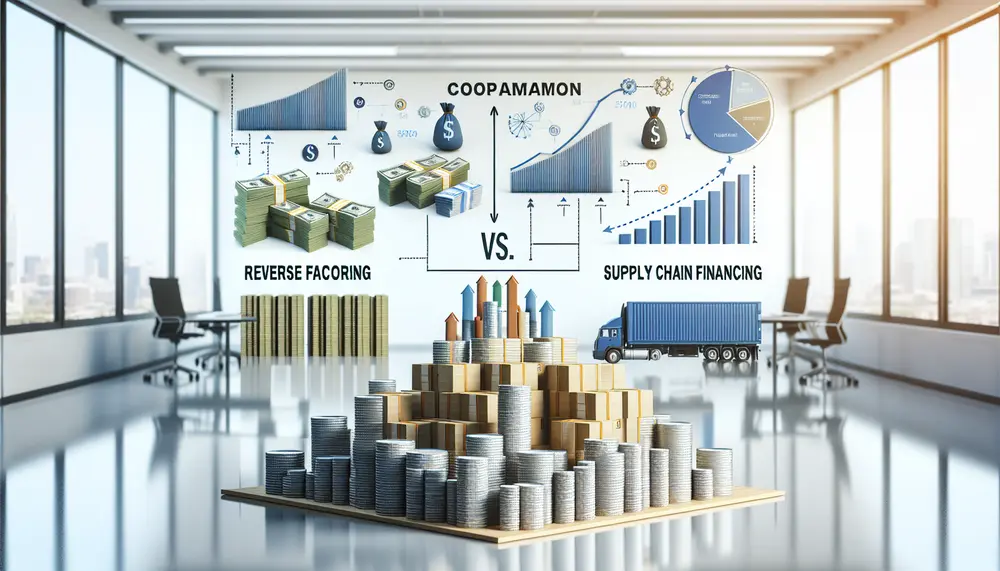Term loan
Term loan
What Is a Term Loan?
A term loan is a type of loan that is paid back over a set period of time, predetermined by an agreement between the borrower and the lender. It's commonly used by businesses to finance large purchases or investments, like machinery or a building. A term loan usually involves a fixed interest rate and a monthly or quarterly repayment schedule.
Key Features of Term Loans
When you hear about a term loan in the context of financial factoring, here are the most important details you should understand:
- Fixed Duration - Term loans have a specific end date. This could range from a short-term loan of one year to a long-term loan that might extend up to 20 years or more.
- Interest Rate - Depending on the lender and your credit profile, the loan could have a fixed or variable rate of interest.
- Repayment Schedule - Payments are often required at regular intervals, usually monthly or quarterly, and include both principal and interest.
- Collateral - Term loans are often secured, which means they require collateral. If you can't make payments, the lender can take the collateral to recover the lent amount.
How Does a Term Loan Relate to Financial Factoring?
Financial factoring is a form of debtor finance where a business sells its accounts receivable to a third party at a discount to obtain immediate cash. This is a separate financial product from a term loan but can play a role in a company's overall financial strategy. If a business needs quick access to cash and doesn't want, or qualify for, a term loan, it might consider factoring its receivables instead. Additionally, funds obtained from factoring can be used to pay off or make payments on a term loan.
Benefits of a Term Loan
Term loans can provide stability to a company's financial planning with their predictable payment schedules. This kind of loan provides a lump sum of cash upfront, which can be essential for large investments to drive business growth.
Choosing the Right Loan for Your Business
Selecting the right financing tool is crucial. A term loan might be ideal if you need a specific amount of money and have the capacity to make consistent payments over time. On the other hand, if your company has cash flow issues and outstanding invoices, financial factoring could offer a faster solution. In some scenarios, businesses combine both tools to achieve their financial goals.
Conclusion
Understanding the term loan and its role in a business's financial toolbox is essential. It's a reliable option for funding long-term investments, but it's just one of many financial strategies available. Companies must consider their immediate cash needs, repayment abilities, and overall financial health to determine whether a term loan or another financial product like factoring suits their situation best.
Blog Posts with the term: Term loan

Reverse factoring has become crucial in supply chain finance, offering liquidity benefits but posing significant accounting challenges under US GAAP due to classification and disclosure complexities. Recent FASB updates emphasize transparency, requiring detailed disclosures to ensure financial statements reflect the...

The article compares reverse factoring and supply chain financing, highlighting their differences in initiation, process, flexibility, cost structure, and risk management. It explains that while both methods aim to improve cash flow and strengthen financial relationships within the supply chain,...

Reverse factoring, also known as supply chain financing, involves a company using a financial intermediary to pay its suppliers early while the buyer settles the full invoice amount later. This arrangement benefits both supplier cash flow and buyer payment flexibility...

Invoice financing in Nigeria is rapidly growing, offering SMEs and contractors flexible cash flow solutions through digital platforms and tailored products amid tight credit conditions. This trend benefits businesses with reliable customers by enabling faster growth, improved supplier relationships, and...

The article explains invoice factoring and discounting as financing options to improve business cash flow by accessing funds tied up in unpaid invoices. It details how each method works, their benefits such as immediate access to cash and improved liquidity,...

This article provides a beginner's guide to understanding traditional finance and factoring, explaining their differences, advantages, and disadvantages. Traditional finance includes loans and credit lines with stringent criteria that may affect debt ratios, while factoring offers quick cash flow by...

Invoice financing in Saudi Arabia offers businesses a way to convert pending invoices into immediate cash, enhancing liquidity without incurring long-term debt or affecting client relationships....

Debt factoring, or invoice factoring, provides businesses with immediate cash flow by selling outstanding invoices to a factoring company. This financial tool offers benefits such as improved cash flow, quick access to working capital, reduced administration time and costs, enhanced...

Factoring in corporate finance allows businesses to sell their invoices at a discount for immediate cash flow, providing liquidity and managing accounts receivables efficiently. It offers advantages over traditional financing by improving cash flow without accruing debt or requiring collateral,...

Maturity Factoring is a financial service where businesses sell their future-due invoices to a factor who pays them on the invoice's maturity date, allowing for aligned cash flow and predictable financial planning. It differs from traditional factoring by not providing...

Debt factoring, or invoice factoring, is a financial strategy where businesses sell their accounts receivable to a third party at a discount for immediate cash. This improves cash flow management, enhances financial stability by reducing debt levels and administrative burdens,...

Financing and factoring are two financial strategies for managing cash flow, with financing involving loans to be repaid over time and factoring entailing the sale of accounts receivable for immediate cash. Each option has distinct terms, costs, benefits, and impacts...

Invoice financing and bill discounting are financial strategies that help businesses access funds tied up in unpaid invoices, with invoice financing using invoices as collateral for loans while bill discounting involves selling them at a discounted rate; the choice between...

Factoring of debts allows businesses to sell their accounts receivable for immediate cash, improving liquidity and enabling them to manage short-term expenses and growth opportunities without incurring new debt. Unlike traditional lending which depends on the business's creditworthiness, factoring focuses...
